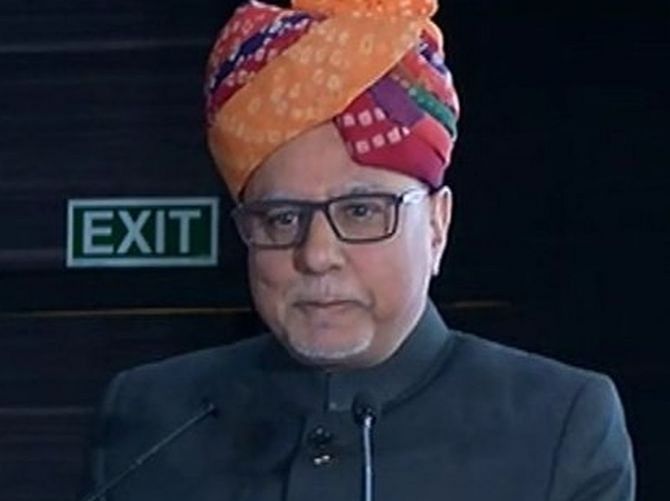 | « Back to article | Print this article |
The chairman of the Essel Group says he has settled 91.2 per cent of the estimated Rs 11,000 crore debt on the group's books.
Vanita Kohli-Khandekar reports.

Even at 71, trust Subhash Chandra to shake things up.
Last month, the chairman of the Essel Group wrote an open letter stating that he had settled 91.2 per cent of the estimated Rs 11,000 crore (Rs 110 billion) debt on the group's books.
And that he will, in a bit, settle the rest, too.
He also talked, rather vaguely, about a digital venture that would not conflict with Zee Entertainment Enterprises (ZEEL), formerly a key firm in the group.
The struggle to get rid of the debt, piled on because of Chandra's ambitious bets in infrastructure, has meant selling off stakes in group firms.
The promoter shareholding in ZEEL -- by far the best firm in the Essel portfolio -- has gone from 41.6 per cent in 2018 to just over 4 per cent.
Chandra reiterates that this happened as a result of the decisions he took.
He also apologised to various people, including his brother Jawahar Goel who runs another group firm, Dish TV.
In January 2019, when ZEEL's stock price went into a freefall on rumours of the crisis, Chandra wrote an open letter stating the problem, accepting responsibility for it and requesting for time to settle it.
It calmed the markets.
By the end of 2019, Chandra had stepped down from ZEEL. He is now chairman emeritus.
The reason for this second letter, however, is not clear; Chandra did not speak to us.
His message is that he will when 100 per cent of the debts are cleared.
Maybe this letter is a confidence building move for the remaining debtors; maybe it is a declaration of things to come.
The latter is more Chandra's style.
His journey from an 18 year old who turned around the family’s food grain processing business to becoming the head of an eclectic Rs 30,000 crore (pre-crisis) empire is now part of corporate legend in India.
A restless, serial entrepreneur, he had by the age of 41 made a fortune exporting and processing food grains, set up one of the world's largest flexi packaging firms (Essel Propack) and a huge leisure park (EsselWorld).
That is when he saw CNN in 1991.
He saw the potential for satellite TV in a media-starved market like India and began a conversation with Hutchison, the only company with a satellite broadcasting into large parts of Asia.
By October 1992, Zee TV was on air.
Many of his moves, especially his influence on broadcasting policy, have been viewed with scepticism.
But overall both he and Rupert Murdoch, who bought Star TV from Hutchison in 1993, have helped develop the Indian media market.
In 2018, Murdoch sold most of Twenty First Century Fox's entertainment assets, including Star India, to the Walt Disney Company.
This future-proofed it against the onslaught of digital, say analysts.
Just when Murdoch was negotiating with Disney, Zee changed hands, thanks to the debt crisis.
Therefore, both Star and Zee, the progenitors of the Indian broadcast market, now have different owners.
Just like the global map of entertainment, the Indian one too is being redrawn.
The battle for dominance in entertainment video will be fought between a handful of firms with huge toplines -- Disney-Star (Rs 14,000 crore/Rs 140 biillion), Jio owned by the $92 billion Reliance Industries, the $13 billion telecom giant Bharti Airtel, Google's YouTube ($20 billion), Netflix ($25 billion), Amazon Prime Video (estimated $25 billion) and maybe a couple of others.
Every media firm under Rs 10,000 crore (Rs 100 billion) is now looking to bulk up.
For two years there have been reports of Sony making a bid for ZEEL, then for Viacom18.
The Rs 7,840 crore (Rs 78.40 billion) cash-spewing ZEEL with a dominant hold over audiences across Hindi, Marathi, Tamil, Bangla and other languages is a great asset for any firm wanting a stronghold in India's Rs 1,383 billion media and entertainment business.
Its 47 domestic channels had a 19 per cent share of all TV viewing in 2020; its OTT ZEE5 was at over 20 million monthly active users in February this year; and it had a robust film production business (Sairat, Article 15, Secret Superstar) till the pandemic hit.
ZEEL is now independent of the Chandra family, in a market that has changed dramatically over the last three years.
Only time will tell whether Chandra's letter is a message for strategic investors (unlikely, given that Essel and ZEEL are now delinked), a declaration of action to come or simply a statement of fact.